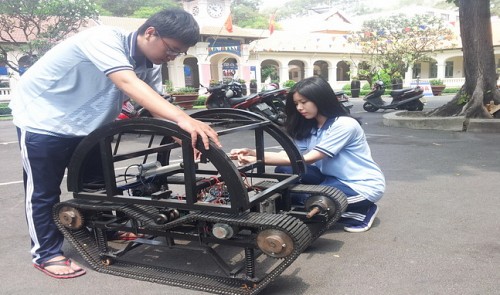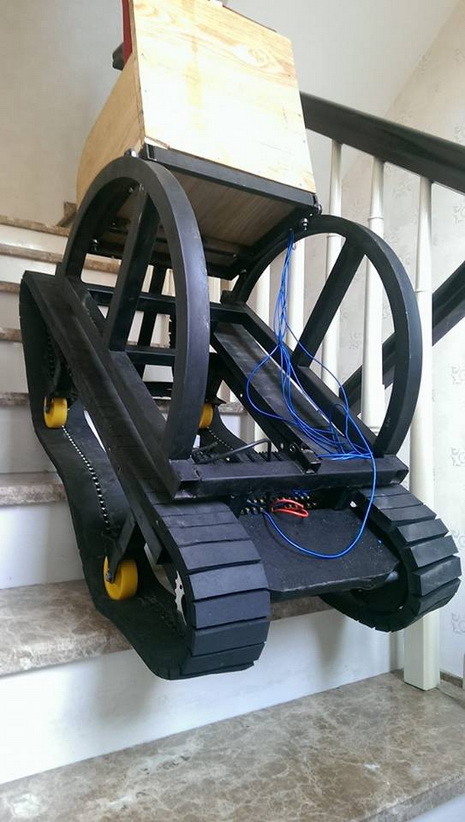Ho Chi Minh City high school duo develop all-terrain wheelchair
A pair of high school students in Ho Chi Minh City have created an all-terrain wheelchair aimed at helping handicapped people maneuver with greater ease in various settings.
 |
| Nguyen Hoang Ngan (L) and Pham Thanh Truc work on their TN98 all-terrain wheelchair. (Photo: Tuoi Tre) |
While most of their peers are revising for upcoming exams, Nguyen Hoang Ngan and Pham Thanh Truc, both seniors at Le Hong Phong High School for the Gifted in District 5, have been spending their time in a workshop scanning through English materials to develop their all-terrain wheelchair.
The idea for the wheelchair came from a time when Ngan saw his grandfather and other elders in his hometown only being able to stay around their homes because they were too weak to go anywhere on their own.
The duo’s all-terrain wheelchair, codenamed TN98, which are the initials of their respective names and their year of birth, earned them the first prize at the 2016 National Science Contest for high school students in the south, which was held in Dong Nai Province in March.
The wheelchair is equipped with a controller to control its basic movements such as forward, stop, left, right, and a sensor to automatically adjust the chair’s inclination.
Compared to wheelchairs with similar functionalities, TN98 is smaller in size, which helps it get through narrow areas such as doors, corridors, elevators, porches, and others.
Instead of using round wheels like common wheelchairs, TN98 moves around on rubber caterpillar tracks ‘manufactured’ by Ngan and Truc themselves.
The larger surface area of the tracks distributes the weight of the vehicle more efficiently than normal wheels, which enables the chair to traverse muddy or sandy grounds easily, and has already proven useful, especially on Viet Nam’s roads.
 |
| The all-terrain wheelchair TN98 is pictured climbing stairs. (Photo: Tuoi Tre) |
Another notable feature of TN98 is that it helps the operator climb stairs as steep as 30 degrees in gradient and with a height of each step up to 25 centimeters.
The rubber tracks increase traction and prevent slips, allowing the wheelchair to go up and down stairs at up to seven kilometers per hour.
The idea of a chair that climbs stairs has been realized by a group of Swedish students before, but their chair required the operator to sit with their back to the stairs, which may make them feel anxious during the process.
Facing the same problem in the development process, after several experiments, Ngan and Truc came up with utilizing dynamic equilibrium between two semicircular frames to create a balanced system.
The system allows the seat to automatically adjust its position and inclination to shift the wheelchair’s center of gravity. The seat falls forward as the wheelchair goes up and vice versa, maintaining a balanced position for the operator.
According to Ngan, if put into mass production, a TN98 would cost around VND17 million (US$750) to make, in comparison to around VND300 million ($13,458) for an all-terrain wheelchair manufactured by a foreign company.
Ngan said the total expense for TN98 research and development was VND20 million ($900).
Apart from professional consultation from their teachers, Ngan and Truc also received financial assistance from the school which covered a third of their expenses.
Up until now, TN98 has undergone seven upgrades, and the duo are still working to optimize their product and reduce its weight to make it more durable, easy to dissemble and re-assemble, improve engine efficiency, and install a safety frame to protect the operator in case of accidents.
The two will bring TN98 to the U.S. in May to participate in the Intel International Science and Engineering Fair 2016 (Intel ISEF 2016), organized by Intel Corporation.
Ngan and Truc said their highest goal in joining the fair was not to win the first prize, but to attract attention from U.S. sponsors who will hopefully agree to mass produce their creation.
The two added that they would still be willing to exchange ideas even if an investor would only show an interest in their product, as their ultimate goal is to help the elderly and handicapped in Viet Nam.
Dr. Tran Van Lang from the Viet Nam Academy of Science and Technology said the TN98 all-terrain wheelchair was based on applied research with high potential for mass production and use.
Dr. Lang did add, however, that the students should not be put under too much pressure to put their idea into real use too soon, for they still have their youth to live and it is praiseworthy enough that they have shown passion for scientific research and application.
“The answer to whether an idea can come into life lies within life itself, while in this contest, the panel’s evaluation and even the prize only serve as an encouragement to nurture their passion and efforts,” he said.
(Source: Tuoi Tre News)




